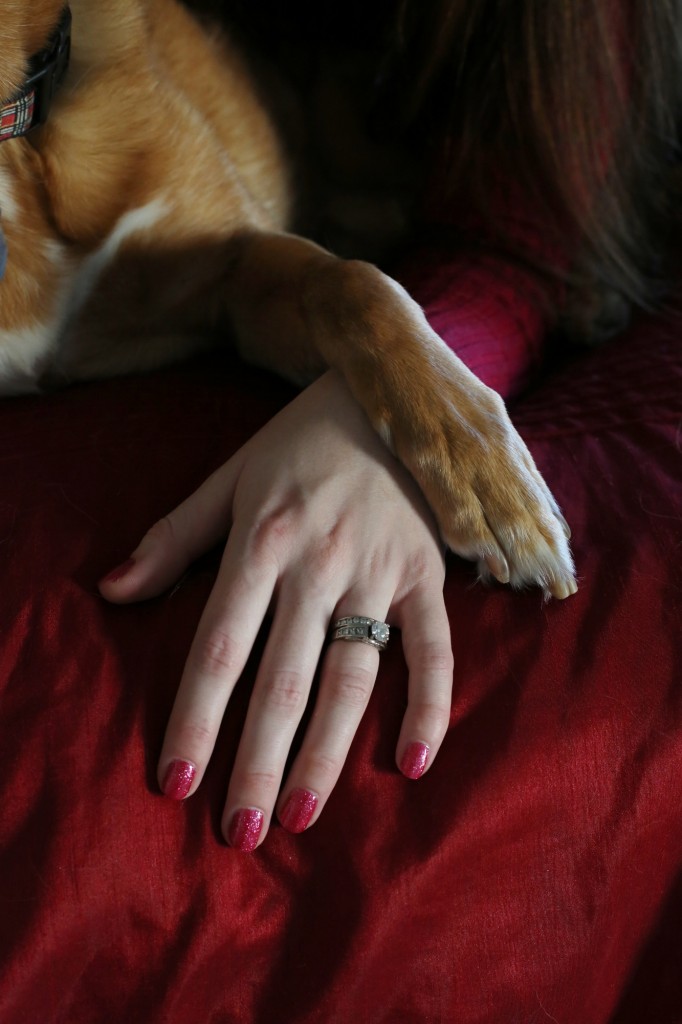
By Gina Cooke
My dishwasher broke. So I’m standing at my sink, hand-washing all of the dirty dishes I’d rinsed and loaded into the dishwasher the day before, plus the rest of what had accumulated since. Doing the dishes always means looking out the kitchen window. In the warm weather, with the window open, I can hear the bullfrogs and waterbirds from down in the creek. Today I’m washing and watching, my rubber-gloved hands warm in the soapy water, Joe’s work-gloved hands lifting broken cinder blocks and chunks of concrete off of the back lawn and onto the trailer, which is hitched to the back of the John Deere.
His arms still bear bruises from the beating he took changing the John Deere’s blades the week before. His shins are scratched from mushroom hunting in shorts deep in the woods, and his right knee is scabbed over from where the guardrail on the bridge gouged him impressively as he tried to climb over it. Last week, he took a weedy thorn to the front of his nose, and it bled and bled and bled, but he said he wasn’t hurt. Now he’s outside my kitchen window, in the fenced-in part of the back yard, bending over and righting himself, lifting and moving one jagged hunk at a time. His black gloves say CAT in big yellow letters. After he has removed the blocks, he mows inside the fence. I go upstairs to get some work done on my laptop, the push mower sputtering in the background. After a while it’s quiet, and he comes in to ask for a burger. I’ve learned to keep ground beef, Swiss cheese, and buns on hand at all times.
I head back to the kitchen and open the fridge, hunting and gathering, tomato, lettuce, ketchup, provolone, that brown mustard that he likes, butter for the cast iron skillet and to toast the buns. I look out the window to see the shorn lawn out back, and Joe in reverse motion now, heaving new cinderblocks off the trailer into a tidy little octagon in the grass, his yellow-lettered CAT hands swinging with each heavy hoist. I quickly pat the beef into concave disks and set them on a smear of butter in the pan. For nearly two decades I was a vegan, but today the sound and smell of sizzling fat and flesh make my mouth water without compunction. Outside, Joe stands back to admire his work: We have a sweet new fire pit in the back yard now. He comes in, washes up, and sits down to his burger and a Gatorade. Purple, low-calorie. His favorite.
There are always a million repair projects around my property. Or maintenance. Sometimes I lose track of the difference. And there are upgrades too. Things that work perfectly well but are ugly or old or otherwise undesirable. I don’t expect Joe to take on everything all on his own. I make calls, set appointments, take care of the household business. I need to have the heating vents cleaned. And several stumps ground out of the front yard to make it easier for Joe to get the mowing done. It’s a part time job, the mowing. A few hours a day, a few days a week, in season, to keep everything sensible around here.
And I had a painter come out the other day to give me a quote on several smallish jobs: My kitchen ceiling has that horrible popcorn texture on it and it’s impossible to clean, so it has this greasy little beard on it right over the stove. Twenty-three years of the detritus of cooking here, ten of them mine. My son’s bedroom needs painting too, and then there’s the trim on the inside.
•••
It used to be that I would come home from work in the late evening to find the house a wreck, my husband and son still in their pajamas, homework incomplete, no dinner or bath or bedtime stories in progress. Upstairs in the master bedroom, my husband would proudly show me the fruits of his day of labor: tiny, elaborate, repeating patterns of flowers and leaves and berries that he had painstakingly painted on the wooden trim around the windows and doors and the crown molding framing the room. He would spend the hours I was at work on a stepladder in the bedroom, choosing and mixing paints and delicate brushes, dabbing dots of gold and silver highlights on his acrylic flora, all the while neglecting the real plants on our small farm and the real boy pinging off the walls downstairs wondering what would ever be for dinner.
•••
The kitchen ceiling and the boy’s room are easy enough problems to solve. The trim is another story. “You could sand it and prime it and paint it,” explained the man through his fuzzy gray beard, “but you’d still be able to see it.” I nodded. “Some days the light will hit it just right, and even with a few coats of paint, those patterns will make themselves known to you again.”
I could imagine exactly what he meant, and there was no way I was going to pay someone to do all that work only to still see those flowers in relief just refusing to die in the afternoon light.
“Call Kevin,” he suggested. “He’ll come in and redo that trim for you, and it’ll be much nicer than what you have now. Get those corners right with a miter saw.”
I think to myself, Joe’s such a real man to be able to lie with me in my big marital bed with that shitty trim and the painted ramblings of an unbalanced mind insistently outlining the bedroom.
•••
My first divorce hearing was scheduled for Valentine’s Day, 2014. We were still living together, but my husband had moved himself to the guest room in the basement. The night before the hearing, the tension in the house was horrific. There was screaming and wailing and it was so, so dark. It finally simmered down to a wretched and tearful talk in the kitchen, just outside my son’s bedroom door. I was exhausted and just wanted to sleep, wanted to be out of my son’s earshot, for crying out loud. I excused myself from further conversation. My husband responded sorely, “I hope you sleep well in the bedroom I made beautiful for you.”
•••
Like my divorce, all these repair projects always cost more than I think they will, and at this point it’s all money I don’t have. In the nineteen months since the sheriff removed my husband from the house, I’ve had to put in a new water treatment system and a new barn door. I bought a new used car on credit—appropriately enough, a Ford Escape. Bought a new doghouse and a new compost bin too.
I put in a security system after my husband broke in. I guess that’s an upgrade, though, not really a repair. I’ve had to replace siding and remove birds’ nests and repair both garage door openers after a bad windstorm. Fixed the refrigerator once and the dishwasher twice; now it’s not working again. I should’ve just replaced it the last time. Sometimes things aren’t worth repairing; it’s cheaper to get a newer, more efficient model than it is to keep sinking money into something that just doesn’t work. I know, I know, that’s how our landfills get full: planned obsolescence. Things don’t always last like they should.
Once Joe moves in, money will be a lot less tight. It’ll be different having a second income in the house after all these years of family breadwinning by myself. He’s not afraid of work. He brings in good money and he’s handy. Strong, incisive, good at figuring out how everything works: people, machines, plants, animals, electronics, toys.
I’ve never once heard him holler at things that get in his way, not even the stump that took out the blades on the John Deere. “There’s no point,” he says. “You can’t reason with inanimate objects.” This property has long felt to me like just a lot of work, but Joe says he’s always wanted to take care of a place like this. I can see that it satisfies him. I hope it stays that way. I’m trying everything I know to make sure that he feels like it’s his home too, even though it’s technically my house. I call it Our House, in the Middle of Our Street. I ask him to help me pick out area rugs and bedding. I’ve made space literally and figuratively: cleaning out closets and dressers, and learning to stop hosting him when he’s here because then he feels like a guest. But nothing that I do or don’t do is really key, because the thing that makes him feel most at home here is working on the place. He likes that John Deere. He was proud of those bruises.
•••
I’ve been known to tell people that owning a home is a lot like being in love: At the outset, it’s all spacious and bright and airy. It looks and feels perfect and seems worth all the sacrifices you had to make to get it. But then you move in and you start to fill it with your crap and you notice its flaws. Spaces fill up. Cracks start to show. New things get old. The dust settles, and one day you look around your place and realize that it’s not only not perfect, it’s a hell of a lot of work. Everything needs repair or maintenance or replacement. So you sand and you prime and you paint, and one day the light hits things just right and those old patterns just make themselves known all over again. An adult lifetime of monthly payments starts to seem a lot longer than it once did.
I also tell people that this home is a dream home, but it was someone else’s dream. I’m a city girl, a third-generation Angeleno. I lived in Paris and Chicago before I married, and I thrived. I never really even imagined myself paying a mortgage, let alone paying for a stump grinder or a John Deere or a barn door. I never dreamed of this place: a big pine-log home with a pitched metal roof and skylights, perched atop hilly green acreage in the rural Midwest. This winding road runs between two small central Illinois towns, and all my neighboring farmers—real farmers—have gone organic.
This place is beautiful, no question, when I take a longer view, when I can see past the claustrophobia of repairs and projects and dust. Out front, I have a porch swing and a healthy ecosystem and a pretty good sunset almost every night. There is no time of year that the view out my bedroom window is not breathtaking, if I look beyond the framework of florid trim. When it’s winter and the air is frozen clean, the early twilight colors the snow on the ground periwinkle blue. It happens every year. I’ve spent a decade in this house all told, long enough to see the patterns emerge.
•••
My husband had two favorite lies, and he told them louder and more frequently the closer I got to divorcing him: One was “you’ll never be able to take care of this place without me,” and the other was “no one else will ever love you.” I’m in my seventh season on my own here now; soon Joe will move in and that will change. It’s a good change, I think. The light is hitting everything just right, and from my perspective, it all seems to be in good repair.
•••
GINA COOKE is a linguist working toward her second graduate degree, a pursuit that has spanned half of her adult life. She lives and works on a small farm in the rural Midwest with her son and her dog. She typically writes about spelling: word histories, word structure, and word relatives. This is her first foray into the personal.

 Follow
Follow



